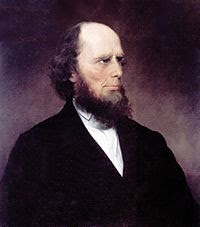 |
| Revivalist Charles G. Finney - Wikipedia |
By Dr. R. Scott Clark - Posted at The Heidelblog:
Since the early 19th century American Christianity has been largely dominated by a revival of the original Anabaptist theology, piety, and practice. One can transpose much of what took place in the 19th century over the fist generation Anabaptists (1520s) and it matches up quite well. The original Anabaptists would have understood completely the Millerite eschatological fervor of the 1820s–40s. They would understand completely the claims of continuing revelation made by Joseph Smith and the Mormons in the same period. At least some of the original Anabaptists would have understood the bald Pelagianism of Charles Finney (1792–1875). The Cane Ridge Revival (1801) would have made perfect sense to the original Anabaptists as it fit their vision of piety almost perfectly.
Evangelical Christianity in America as it has been received in the 20th and 21st centuries is very much the product of that revived Anabaptist theology, piety, and practice. The Second Great Awakening was a radically democratic, egalitarian, entrepreneurial, enterprise. Theologically, it was by turns mystical and rationalist. Further, the Second Great Awakening didn’t just happen out of the blue. It did not fall out of the sky like golden plates and magic spectacles. There’s a direct, organic connection between the 1GA and the 2nd but we’ll press on lest we move from preaching to meddling.
The enthusiastic (in the strict sense) piety of the 2GA faded in the second half of the 19th century but “fresh light” broke forth again in the revivals in Topeka, KS and Azusa Street (Los Angeles) at the turn of the 20th century. The patterns established in the earlier “revivals” have been formative for American evangelicalism.